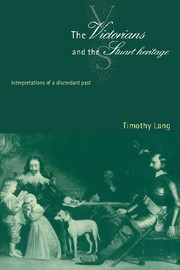Book contents
- Frontmatter
- Contents
- Preface
- Acknowledgments
- Introduction
- 1 Henry Hallam and early nineteenth-century Whiggism
- 2 Thomas Babington Macaulay and Victorian religious controversy
- 3 Puritanism and the ideology of Dissent
- 4 Samuel Rawson Gardiner and the search for national consensus
- 5 Cromwell and the late Victorians
- Epilogue
- Index
2 - Thomas Babington Macaulay and Victorian religious controversy
Published online by Cambridge University Press: 06 October 2009
- Frontmatter
- Contents
- Preface
- Acknowledgments
- Introduction
- 1 Henry Hallam and early nineteenth-century Whiggism
- 2 Thomas Babington Macaulay and Victorian religious controversy
- 3 Puritanism and the ideology of Dissent
- 4 Samuel Rawson Gardiner and the search for national consensus
- 5 Cromwell and the late Victorians
- Epilogue
- Index
Summary
Macaulay's immensely popular History of England has received greater critical notice than perhaps any other book of its kind written during the Victorian period. And yet, despite all this attention, few commentators have appreciated the extent to which these five volumes, published between 1848 and 1861, can be read as a liberal response to the religious disputes that dominated English politics from the passing of the Reform Act in 1832 to the furor over “Papal aggression” in the early 1850s. Macaulay himself certainly knew that his book would be read in this way. On the publication of his first two volumes in 1848 he noted in his journal: “I expect… furious abuse both from the ultra Evangelicals and from the Tractarians, nor shall I be sorry to be so abused.” Several days later he remarked: “It is odd that I have not yet seen a single line – encomiastic or vituperative – on the religious disquisitions which fill so many pages of the book, and which, I should have thought, must have excited the indignation of all sects, Papists, Churchmen, Puritans, and Quakers. But this I suppose is still to come.” Macaulay's History did eventually arouse considerable controversy, and much as he anticipated it was not over his interpretation of the Revolution's secular achievement.
- Type
- Chapter
- Information
- The Victorians and the Stuart HeritageInterpretations of a Discordant Past, pp. 53 - 92Publisher: Cambridge University PressPrint publication year: 1995



